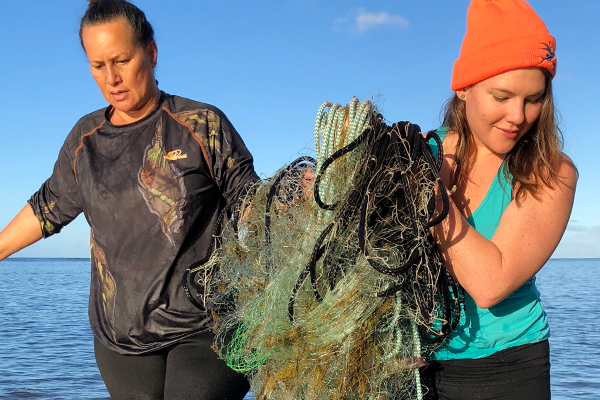Maui Nui Makai Network
Strengthening Local Knowledge to Restore Oceans
 Photo courtesy of Manuel Mejia
Photo courtesy of Manuel Mejia
Known as “the fish of kings,” moi was once reserved for aliʻi and is still considered a culturally significant fish in Hawaiʻi. State regulations prohibit catching moi between June and August, their spawning season. There’s just one problem: local fishers in Kīpahulu noticed the silvery fish were still spawning as late as September.
“We want to extend the season by a month on either side, to make sure the fish have a chance to spawn before they’re harvested,” says Scott Crawford, executive director of Kīpahulu ʻOhana, a grassroots nonprofit dedicated to the cultural sustainability of the Kīpahulu moku (district) in East Maui.
The group is seeking Community-Based Subsistence Fishing Area (CBSFA) designation from the Department of Land and Resources for 1,650 acres of ocean across 5.7 miles of coastline in Kīpahulu. Many have spent decades working to achieve designation for place-based marine management. If approved, the status would enable the community to set fishing regulations based on local knowledge of the environment and culture.
Each community is dealing with their own challenges. But coming together and forming a network provides support and encouragement.
- Karin Osuga, Coordinator, Maui Nui Makai Network
Helping Kīpahulu ʻOhana achieve this goal is the Maui Nui Makai Network, the first community-based marine conservation network in Maui that supports and connects community groups across Maui County who care for and restore the coastal environment. The network was formed in 2013 and engages seven community groups that actively manage the coastal areas of Moloka‘i, Lāna‘i, West Maui, Central Maui, and East Maui.
“Each community is dealing with their own challenges,” says Karin Osuga, coordinator for the Maui Nui Makai Network. “But coming together and forming a network provides support and encouragement.”
In addition to supporting efforts like CBSFA designation, the network has reached over 1000 people through its outreach efforts designed to share diverse experiences, lessons, and best practices of restoring healthy ecosystems. The group holds regular meetings and workshops, which have moved online during the pandemic, addressing topics ranging from climate change to delivering effective testimony at the Legislature.
This year, the network launched a free, public speaker series, Mālama I Ke Kai, and is held online the third Thursday of each month. Many of the speakers are indigenous and share their culturally rooted management practices, which have benefitted their areas for years, including from Africa, Yurok Nation, Moloka‘i, and Oneisomw Community in Micronesia.
“There’s also a lot of informal talk story, too—sharing with each other and learning from each other—because there’s so much knowledge held in our communities,” Osuga says. “It’s about empowering the community and making their voices heard.”
Read more Stories of Impact